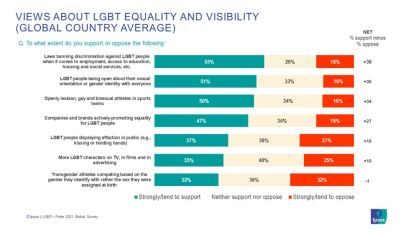Context
The emergence of the pink economy in India signifies a notable shift in the country's economic landscape, with an estimated purchasing power of US$ 168 billion. This economy represents the LGBTQ+ community and its potential to wield considerable influence over economic outcomes. However, its growth is hindered by pervasive stigma and discrimination, reflecting the principles of queer economics. Understanding the interplay between societal attitudes, economic factors, and the LGBTQ+ community is crucial for fostering inclusive economic growth and sustainable development in India.
The Indian Scenario
In India, the pink economy reflects the challenges faced by the LGBTQ+ community, including discrimination and stigma across various aspects of life. These challenges contribute to high dropout rates in schools and limited access to formal education, hindering employment opportunities and economic participation. Research indicates that the cost of homophobia to India's GDP ranges from 0.1% to 1.7%, highlighting the economic consequences of discrimination. To address this, inclusive policies and initiatives are needed to support the LGBTQ+ community and unlock its economic potential.
A Few LGBTQ+ Inclusion Initiatives
|
Report |
Corporates |
Key Points |
Recommendations |
|
A Manifesto for Trans Inclusion in the Indian Workplace |
Godrej |
Emphasizes adherence to global LGBTQ+ policies for enhancing competitiveness, attracting talent, and brand image |
- Implement anti-discrimination workplace policy - Adopt inclusive HR practices - Conduct awareness programs - Provide health insurance and related benefits |
|
Creating Inclusive Workplaces for LGBT Employees in India |
Community Business |
Highlights economic benefits and dual appeal of inclusive LGBTQ+ spaces |
- Enforce anti-harassment policies - Support LGBTQ+ employees through HR practices - Establish LGBT employee networks - Offer specific benefits - Utilize respectful LGBT marketing - Incorporate gender identity and sexual orientation in employee surveys |
|
The Economic & Business Case |
Open for Business |
Advocates for promoting LGBT+ inclusion to positively impact economic, business, and individual performance |
- Collaborate with LGBTQ+ groups - Provide legal support - Advocate for policy changes in the LGBTQ+ community |
|
Deloitte Global 2023 LGBT+ Inclusion @ Work |
Deloitte |
Highlights the benefits of LGBTQ+ inclusion in enhancing workplace dynamics and addressing diverse experiences |
- Recognize and address intersectional aspects of LGBT+ employees' experiences |
Challenges and Opportunities
Despite facing significant challenges, there are opportunities for fostering LGBTQ+ inclusion in India's economy. Corporations are increasingly recognizing the economic benefits of LGBTQ+ inclusion, leading to the implementation of inclusive policies and initiatives. For example, companies like Godrej and Deloitte have adopted anti-discrimination policies and support networks for LGBTQ+ employees. Additionally, initiatives such as inclusive education and awareness programs can help transform societal attitudes and create more inclusive workplaces, contributing to economic growth and development.
Corporate Activism and Public Perception
Corporate activism promoting LGBTQ+ equality has gained widespread support in India and globally. A survey conducted by Ipsos showed strong support for equality and acceptance of LGBTQ+ individuals in corporate settings. However, there are varying opinions on certain issues, such as transgender athletes' participation in sports. Despite this, cities like Bengaluru exemplify inclusive corporate cultures that contribute significantly to the economy and attract multinational companies. By promoting LGBTQ+ inclusion in the corporate sector, India can harness the economic potential of the pink economy and drive sustainable growth.
Strategies for Inclusive Economic Growth
To realize the full potential of the pink economy, India needs a comprehensive strategy that addresses societal attitudes, legal frameworks, and economic empowerment initiatives. Research and development efforts should focus on understanding the specific needs and challenges of the LGBTQ+ community, while anti-discrimination laws and policies must be implemented to protect their rights in the workplace. Inclusive education and awareness programs can help change societal attitudes and create a more supportive environment for LGBTQ+ individuals, leading to increased economic participation and opportunities for growth. Additionally, economic empowerment initiatives, such as skills training and entrepreneurship support, can help unlock the talents and potential of the LGBTQ+ community, driving innovation and economic development.
Conclusion
The emergence of India's pink economy represents a significant opportunity for inclusive economic growth and development. However, pervasive stigma and discrimination against the LGBTQ+ community hinder its progress and contribute to economic losses. By implementing inclusive policies and initiatives, fostering corporate activism, and promoting societal acceptance, India can unlock the economic potential of the pink economy and drive sustainable growth. Collaboration between government, corporations, and civil society is essential to create a more inclusive and prosperous future for all.
|
Probable Questions for UPSC Mains Exam
|
Source – The Hindu, Ministry of Social Justice







